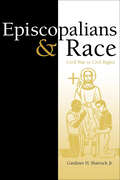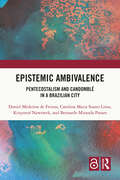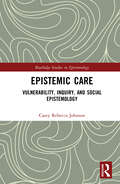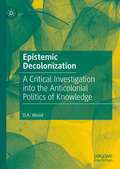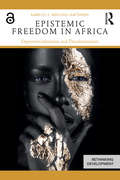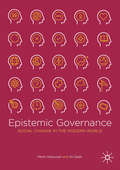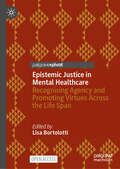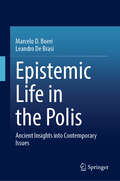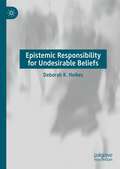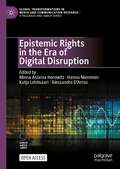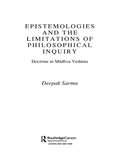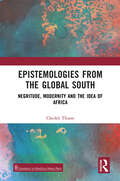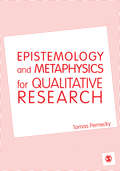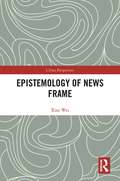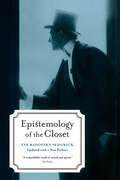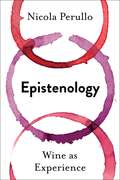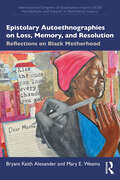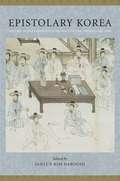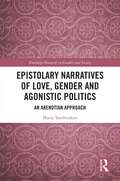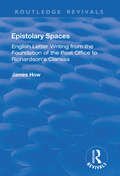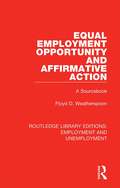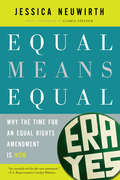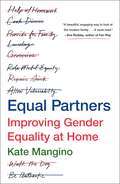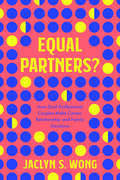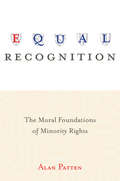- Table View
- List View
Episcopalians & Race: Civil War to Civil Rights (Religion In The South Ser.)
by Gardiner H. Shattuck Jr.“Superb. . . . The first comprehensive history of modern race relations within the Episcopal Church and, as such, a model of its kind.” —Journal of American HistoryMeeting at an African American college in North Carolina in 1959, a group of black and white Episcopalians organized the Episcopal Society for Cultural and Racial Unity and pledged to oppose all distinctions based on race, ethnicity, and social class. They adopted a motto derived from Psalm 133: “Behold, how good and joyful a thing it is, for brethren to dwell together in unity!” Though the spiritual intentions of these individuals were positive, the reality of the association between blacks and whites in the church was much more complicated. Episcopalians and Race examines the often ambivalent relationship between black communities and the predominantly white leadership of the Episcopal Church since the Civil War. Paying special attention to the 1950s and 60s, Gardiner Shattuck analyzes the impact of the civil rights movement on church life, especially in southern states, offering an insider’s history of Episcopalians’ efforts, both successful and unsuccessful, to come to terms with race and racism since the Civil War.“A model of how good this kind of history can be when it is well researched and centers on the difficult choices faced and made by people who share institutional and faith commitments in settings that call those commitments into question.” —American Historical Review“Will be of considerable benefit to scholars, students, church members of all denominations, and anyone concerned with issues of racial justice in the American context.” —Choice“An essential addition to the history of race and the modern South.” —Journal of Southern History
Epistemic Ambivalence: Pentecostalism and Candomblé in a Brazilian City
by Krzysztof Nawratek Daniel Medeiros de Freitas Carolina Maria Soares Lima Bernardo Miranda PataroThis book delves into the complex relationship between religious imaginaries and the perception of space among followers of Candomblé and Pentecostal churches in Belo Horizonte, Brazil's third-largest urban agglomeration. It adopts a dual perspective, examining the broader political, economic, and social dimensions of these religious communities' urbanisation and spatial distribution and their members' individual beliefs and behaviours. Through this approach, the book aims to provide a nuanced and insider's view of these religious positions, challenging our preconceived notions of urban spaces and contributing to the larger discussion of decolonial urban theory and spatialised post-secular thought. This transdisciplinary book will appeal to a broad range of researchers, particularly those interested in urban and religious studies. Its strong spatial perspective makes it attractive to architects and urban designers. It will be of interest to those in human geography, urban planning, design, architecture, political science, religious studies, and culture studies. The Open Access version of this book, available at http://www.taylorfrancis.com, has been made available under a Creative Commons Attribution-Non Commercial (CC-BY-NC) 4.0 license.
Epistemic Care: Vulnerability, Inquiry, and Social Epistemology (Routledge Studies in Epistemology)
by Casey Rebecca JohnsonThis book uses the framework of care ethics to articulate a novel theory of our epistemic obligations to one another. It presents an original way to understand our epistemic vulnerabilities, our obligations in education, and our care duties toward others with whom we stand in epistemically vulnerable relationships. As embodied and socially interdependent knowers, we have obligations to one another that are generated by our ability to care – that is, to meet each other’s epistemic vulnerabilities. The author begins the book by arguing that the same motivations that moved social epistemologists away from individualistic epistemology should motivate a move to a care-based theory. The following chapters outline our epistemic care duties to vulnerable agents, and offer criteria of epistemic goodness for communities of inquiry. Finally, the author discusses the tension between epistemic care and epistemic paternalism. Epistemic Care will be of interest to scholars and advanced students working in social epistemology, ethics, feminist philosophy, and philosophy of education.
Epistemic Decolonization: A Critical Investigation into the Anticolonial Politics of Knowledge
by D.A. WoodEuropean colonization played a major role in the acquisition, formation, and destruction of different ways of knowing. Recently, many scholars and activists have come to ask: Are there ways in which knowledge might be decolonized? Epistemic Decolonization examines a variety of such projects from a critical and philosophical perspective. The book introduces the unfamiliar reader to the wide variety of approaches to the topic at hand, providing concrete examples along the way. It argues that the predominant contemporary approach to epistemic decolonization leads one into various intractable theoretical and practical problems. The book then closely investigates the political and scientific work of Frantz Fanon and Amílcar Cabral, demonstrating how their philosophical commitments can help lead one out of the practical and theoretical issues faced by the current, predominant orientation, and concludes by forging links between their work and that of some contemporary feminist epistemologists.
Epistemic Freedom in Africa: Deprovincialization and Decolonization (Rethinking Development)
by Sabelo J. Ndlovu-GatsheniEpistemic Freedom in Africa is about the struggle for African people to think, theorize, interpret the world and write from where they are located, unencumbered by Eurocentrism. The imperial denial of common humanity to some human beings meant that in turn their knowledges and experiences lost their value, their epistemic virtue. Now, in the twenty-first century, descendants of enslaved, displaced, colonized, and racialized peoples have entered academies across the world, proclaiming loudly that they are human beings, their lives matter and they were born into valid and legitimate knowledge systems that are capable of helping humanity to transcend the current epistemic and systemic crises. Together, they are engaging in diverse struggles for cognitive justice, fighting against the epistemic line which haunts the twenty-first century. The renowned historian and decolonial theorist Sabelo J. Ndlovu-Gatsheni offers a penetrating and well-argued case for centering Africa as a legitimate historical unit of analysis and epistemic site from which to interpret the world, whilst simultaneously making an equally strong argument for globalizing knowledge from Africa so as to attain ecologies of knowledges. This is a dual process of both deprovincializing Africa, and in turn provincializing Europe. The book highlights how the mental universe of Africa was invaded and colonized, the long-standing struggles for 'an African university', and the trajectories of contemporary decolonial movements such as Rhodes Must Fall and Fees Must Fall in South Africa. This landmark work underscores the fact that only once the problem of epistemic freedom has been addressed can Africa achieve political, cultural, economic and other freedoms. This groundbreaking new book is accessible to students and scholars across Education, History, Philosophy, Ethics, African Studies, Development Studies, Politics, International Relations, Sociology, Postcolonial Studies and the emerging field of Decolonial Studies.
Epistemic Governance: Social Change in the Modern World
by Pertti Alasuutari Ali QadirThis book argues that modern governance is performed by actors who seek social change epistemically, by drawing on widespread, public views of reality. Agents of change such as parliamentarians or social movement activists will assess and affect what they believe to be people’s conceptions of what is possible, rational, and desirable. This often means that these key authority figures will invest in credible knowledge production, as well as appeal to individual and group identifications, emotions, and values.Alasuutari and Qadir show how this epistemic governance works in three important arenas of social change: parliaments, which debate laws that constitute the bulk of reforms; international organizations that circulate global norms; and social movements and NGOs. Through their analysis, the authors’ detailed, innovative methodology for discourse analysis indicates the utility of epistemic governance as a new paradigm for research into global social change. This book will be of use to students in upper level degree programs who want to design empirical research into social change as well as researchers in sociology, political science and public policy.
Epistemic Justice in Mental Healthcare: Recognising Agency and Promoting Virtues Across the Life Span
by Lisa BortolottiThis open access book explores epistemic justice in mental healthcare, bringing together perspectives from psychologists, psychiatrists, philosophers, activists, and lived experience researchers. Through eight chapters, authors identify threats to the agency of people who hear voices, experience depression, have psychotic symptoms, live with dementia, are diagnosed with personality disorders, and face serious mental health issues while receiving palliative care. Considering the power asymmetries in clinical interactions, where patients are vulnerable and healthcare professionals are uniquely placed to offer support, this book reaffirms the importance of recognizing patients as agents and collaborators. Topics covered include trust in the therapeutic relationship, dignity at the end of life, the social dimension of health, stigma in an acute ward, the harm caused by biases and stereotypes, the role of clinical communication, and the promise of digital health. Students, academic researchers, practitioners, as well as mental health charities will benefit from this timely collection.
Epistemic Life in the Polis: Ancient Insights into Contemporary Issues
by Marcelo D. Boeri Leandro De BrasiThis book shows the interesting connections within political epistemology that can be established between ancient approaches and contemporary ones. It stems from the conviction that ancient thought can be brought into discussion with contemporary views. Although the book is not intended as an exegetical work, the authors offer detailed interpretations of ancient philosophers while taking into consideration recent specialized discussions in the scholarship with a focus mainly on the systematic aspects of those philosophers rather than on the historical ones. By exploiting insights of Ancient Greek philosophers, and providing an examination of certain intellectual attitudes and virtues that have both an ethical-political and epistemic dimension, the reader will better understand contemporary issues within political epistemology.
Epistemic Responsibility for Undesirable Beliefs
by Deborah K. HeikesThis book considers whether we can be epistemically responsible for undesirable beliefs, such as racist and sexist ones. The problem with holding people responsible for their undesirable beliefs is: first, what constitutes an “undesirable belief” will differ among various epistemic communities; second, it is not clear what responsibility we have for beliefs simpliciter; and third, inherent in discussions of socially constructed ignorance (like white ignorance) is the idea that society is structured in such a way that white people are made deliberately unaware of their ignorance, which suggests their racial beliefs are not epistemically blameworthy. This book explores each of these topics with the aim of establishing the nature of undesirable beliefs and our responsibility for these beliefs with the understanding that there may well be (rare) occasions when undesirable beliefs are not epistemically culpable.
Epistemic Rights in the Era of Digital Disruption (Global Transformations in Media and Communication Research - A Palgrave and IAMCR Series)
by Hannu Nieminen Katja Lehtisaari Minna Aslama Horowitz Alessandro D’ArmaThis open-access volume argues that in a functioning democracy, citizens should be equally capable of making informed choices about matters of social importance. This includes citizens accessing all relevant information and knowledge necessary for informed will formation. In today's complex era of digital disruption, it is not enough to simply speak about communication or even digital rights. The starting point for this volume is the need for 'epistemic equality'. The contributors seek to showcase the history and diversity of current debates around communication and digital rights, as precursors for the need for epistemic rights; both as a theoretical concept and an empirically assessed benchmark. The book highlights scholarship via academic case studies from around the world to feature different issues and methodological approaches, as well as similarities in academic and policy challenges across the globe. The goal is to provide an overview of issues that depict challenges to epistemic rights, extract both academic and applied policy implications of different approaches, and end with a set of recommendations for advancing policy-relevant scholarship on epistemic rights. This volume is intended as the first holistic response to an urgent need to address epistemic rights of communication as a central public policy issue, as an academic analytical concept, as well as a central theme for informed public debate. This book is open-access, meaning you have free and unlimited access.
Epistemologies and the Limitations of Philosophical Inquiry: Doctrine in Madhva Vedanta (Routledge Hindu Studies Series)
by Deepak SarmaDeepak Sarma explores the degree to which outsiders can understand and interpret the doctrine of the Màdhva school of Vedànta. The school is based on insider epistemology which is so restrictive that few can learn its intricate doctrines. This book reveals the complexity of studying traditions based on insider epistemologies and encourages its audience to ponder both the value and the hazards of granting any outsider the authority and opportunity to derive important insights into a tradition as an insider.
Epistemologies from the Global South: Negritude, Modernity and the Idea of Africa
by Cheikh ThiamThis book argues that the pervasiveness of the modern paradigm and its corollary, the colonial matrix of power, have led scholars of Negritude to think of Leopold Sedar Senghor’s work either as an anti-thesis to the anti-Blackness constitutive of European modernity or as another manifestation of the West as subject of history. As opposed to this tradition, the book reads Negritude through the prism of endogenous African world views without the filter of the modern Western paradigm.Print edition not for sale in Sub Saharan Africa.
Epistemology and Metaphysics for Qualitative Research
by Tomas PerneckyThis clearly written and provocative text outlines the wide range of epistemological and metaphysical pillars of research. In a clear, easy to follow style, the reader is guided through an array of concepts that are defined, explained and made simple. With the aid of helpful examples and case studies, the book challenges the prevailing modes of thinking about qualitative inquiry by showcasing an immense variety of philosophical frameworks. Armed with a strong understanding of this philosophical backbone, students will be able to choose and defend a 'pick and mix' of research methods that will uniquely complement their research. Empiricism Rationalism Realism Skepticism Idealism Positivism Post-positivism Idea-ism Hermeneutics Phenomenology Social Ontology Quantum Mechanics Essential reading for new and experienced researchers, this 'must' for any social science bookshelf will help unlock a new level of research creativity.
Epistemology of News Frame (China Perspectives)
by Xiao Wei“Frame analysis” has long been an active field in journalism and communication, but there are many chaotic, ambiguous definitions and duplicated studies. This book combines subjective philosophy with empirical research to fully explore what news framing is and how a media organization's news frame is constructed. Topics discussed include connotation and composition, facts and sources, functions and effects, construction and updates, competition and negotiation, presenting as a whole a clear and systematic epistemological framework and providing inspiration for news frame researchers, media practitioners and the public to understand the role of the news media. In addition, the book also examines and analyses empirical cases from different countries and regions, including particular emphasis on frame analysis in China, which can help foreign readers better understand Chinese media reports.
Epistemology of the Closet, Updated with a New Preface: Updated With A New Preface: A Remarakable Work Of Mind And Spirit
by Eve Kosofsky SedgwickSince the late 1980s, queer studies and theory have become vital to the intellectual and political life of the United States. This has been due, in no small degree, to the influence of Eve Kosofsky Sedgwick's critically acclaimed Epistemology of the Closet. Working from classic texts of European and American writers—including Melville, James, Nietzsche, Proust, and Wilde—Sedgwick analyzes a turn-of-the-century historical moment in which sexual orientation became as important a demarcation of personhood as gender had been for centuries. In her preface to this updated edition Sedgwick places the book both personally and historically, looking specifically at the horror of the first wave of the AIDS epidemic and its influence on the text.
Epistenology: Wine as Experience (Arts and Traditions of the Table: Perspectives on Culinary History)
by Nicola PerulloWe think we know how to appreciate wine—trained connoisseurs take dainty sips in sterile rooms and provide ratings based on objective knowledge and technical expertise. In Epistenology, Nicola Perullo vigorously challenges this approach, arguing that it is the enjoyment of drinking wine as an active and participatory experience that matters.Perullo argues that wine comes to life not in the abstract space of the professional tasting but in the real world of shared experiences; wines can change in these encounters, and drinkers along with them. Just as a winemaker is not simply a producer but a nurturer, a wine is fully known only through an encounter among a group of drinkers in a specific place and time. Wine is not an object to analyze but an experience to make, creatively opening up new perceptual possibilities for settings, cuisines, and companions.The result of more than twenty years of research and practical engagement, Epistenology presents a new paradigm for the enjoyment of wine and through it a philosophy based on participatory and relational knowledge. This model suggests a profound shift—not knowledge about but with wine. Interweaving philosophical arguments with personal reflections and literary examples, this book is a journey with wine that shows how it makes life more creative and free.
Epistolary Autoethnographies on Loss, Memory, and Resolution: Reflections on Black Motherhood (International Congress of Qualitative Inquiry (ICQI) Foundations and Futures in Qualitative Inquiry)
by Bryant Keith Alexander Mary E. WeemsThis book uses letter writing as a form of engaging autoethnography to address relational histories and dynamics such as race, gender, loss, memory and resolution.It is structured around textual performances, poems, and dialogues in the form of letters. Set within the context of adult Black children and their Black mothers, each author uses their letters to reflect on life with and without mama, and their own sense of coming to know themselves in the absence of their mother. Each entry evidence encounters of pain, possibility, and potentiality collated between the authors for a robust thematic underpinning for the reader. Building upon poetic inquiry and autoethnography narratives, this book seeks to build arguments about privatized struggle, and offers a guide on reflection.In addition to students and researchers partaking in autoethnographical studies, this book is suitable for anyone studying qualitative inquiry, performance studies, gender studies, cultural studies, Black studies, anthropology, and performative writing.
Epistolary Korea: Letters in the Communicative Space of the Choson, 1392-1910
by Jahyun Kim HaboushBy expanding the definition of "epistle" to include any writing that addresses the intended receiver directly, JaHyun Kim Haboush introduces readers to the rich epistolary practice of Choson Korea. The Choson dynasty (1392-1910) produced an abundance of epistles, writings that mirror the genres of neighboring countries (especially China) while retaining their own specific historical trajectory. Written in both literary Chinese and vernacular Korean, the writings collected here range from royal public edicts to private letters, a fascinating array that blurs the line between classical and everyday language and the divisions between men and women. Haboush's selections also recast the relationship between epistolography and the concept of public and private space. Haboush groups her epistles according to where they were written and read: public letters, letters to colleagues and friends, social letters, and family letters. Then she arranges them according to occasion: letters on leaving home, deathbed letters, letters of fiction, and letters to the dead. She examines the mechanics of epistles, their communicative space, and their cultural and political meaning. With its wholly unique collection of materials, Epistolary Korea produces more than a vivid chronicle of pre- and early modern Korean life. It breaks new ground in establishing the terms of a distinct, non-European form of epistolography.
Epistolary Narratives of Love, Gender and Agonistic Politics: An Arendtian Approach (Routledge Research in Gender and Society)
by Maria TamboukouThis book revolves around epistolary narratives of women political theorists and activists, following traces of Hannah Arendt’s philosophical approaches to love and agonistic politics. Arend’s interlocutors are four revolutionary women in the long durée of the nineteenth and twentieth centuries in Europe and the USA: the romantic socialist Désirée Véret-Gay, the Marxist Rosa Luxemburg, the anarchist Emma Goldman and the labour activist Rose Pesotta. The book’s central argument is that Arendt’s philosophical thought can throw light on dangerous liaisons between love, gender and agonistic politics, further making connections with feminist ruminations around love as an existential force in the ephemeral constitution of the female self in modernity. Drawing on extended research with physical, digital and published archival collections, the book responds to the challenges of ‘the digital turn’ and highlights the importance of memory work, as a way of understanding the lasting effects of the past on the present. As such, Epistolary Narratives of Love, Gender and Agonistic Politics will appeal to scholars of sociology and gender studies with interests in research methods – particularly archival methods – the work of Arendt, feminist thought and memory studies.
Epistolary Spaces: English Letter-writing from the Foundation of the Post Office to Richardson's "Clarissa" (Studies In Early Modern English Literature)
by James HowThis title was first published in 2003. The author explores and describes the nature of what he terms "epistolary spaces", phenomena that came into being as a result of the foundation during the 1650s of a Post Office available to the general public. He focuses on the history of letter-writing by English men and women, and in so doing he shows how the imaginations of letter writers were affected by the increasingly cheaper, faster and more efficient postal services that were developed throughout the time period covered. The book makes a detailed study of five "real" correspondences, reading the letters in terms of their social and political interest and addressing such concerns as class, gender, collections of model letters and the importance of London to English epistolary spaces. How portrays epistolary spaces variously as arenas in which to explore the new urban culture of London, in the love letters of Dorothy Osborne (1652-4); courtly enclaves, in the diplomatic letters of the dramatist Sir George Etherege (1685-9); and aristocratic redoubts, in the correspondence between the Countesses of Hertford and Pomfret (1739-41). Finally, How examines the letters that constitute Richardson's novel "Clarissa", showing how the artistic achievement of Richardson's greatest novel was aided by almost a century of just such imaginations of epistolary spaces as are to be found in the letters of Clarissa Harlowe, Anna Howe and Robert Lovelace.
Equal Employment Opportunity and Affirmative Action: A Sourcebook (Routledge Library Editions: Employment and Unemployment #9)
by Floyd D. WeatherspoonFirst published in 1985. In this remarkable book, the author has compiled a large collection of resource material that will be of benefit to the student as well as the practitioner of equal employment and affirmative action (EEO/AA). This book includes a broad scope of information on EEO/AA from its infancy and progresses through its rapidly changing and developing stages. Indeed, this book will be an invaluable asset in easily acquiring and supplementing one’s basic knowledge as well as providing a general overview of the subject area.
Equal Means Equal
by Gloria Steinem Jessica NeuwirthWhen the Equal Rights Amendment was first passed by Congress in 1972, Richard Nixon was president and All in the Family's Archie Bunker was telling his feisty wife Edith to stifle it. Over the course of the next ten years, an initial wave of enthusiasm led to ratification of the ERA by thirty-five states, just three short of the thirty-eight states needed by the 1982 deadline. Many of the arguments against the ERA that historically stood in the way of ratification have gone the way of bouffant hairdos and Bobby Riggs, and a new Coalition for the ERA was recently set up to bring the experience and wisdom of old-guard activists together with the energy and social media skills of a new-guard generation of women.In a series of short, accessible chapters looking at several key areas of sex discrimination recognized by the Supreme Court, Equal Means Equal tells the story of the legal cases that inform the need for an ERA, along with contemporary cases in which women's rights are compromised without the protection of an ERA. Covering topics ranging from pay equity and pregnancy discrimination to violence against women, Equal Means Equal makes abundantly clear that an ERA will improve the lives of real women living in America.
Equal Partners: Improving Gender Equality at Home
by Kate Mangino"An inspiring and inclusive guide for rethinking and reworking household gender roles."—Booklist (starred review)"This book is a beautiful, engaging way to look at the modern family and Mangino works to dismantle gendered assumptions and replace them with structured decision making examples and case studies. A must read."—Eve Rodsky, author of Fair PlayFrom gender expert and professional facilitator Kate Mangino comes Equal Partners, an informed guide about how we can all collectively work to undo harmful gender norms and create greater household equity. As American society shut down due to Covid, millions of women had to leave their jobs to take on full-time childcare. As the country opens back up, women continue to struggle to balance the demands of work and home life. Kate Mangino, a professional facilitator for twenty years, has written a comprehensive, practical guide for readers and their partners about gender norms and household balance. Yes, part of our gender problem is structural, and that requires policy change. But much of our gender problem is social, and that requires us to change.Quickly moving from diagnosis to solution, Equal Partners focuses on what we can do, everyday people living busy lives, to rewrite gender norms to support a balanced homelife so both partners have equal time for work, family, and self. Mangino adopts an interactive model, posing questions, and asking readers to assess their situations through guided lists and talking points. Equal Partners is broad in its definition of gender and gender roles. This is a book for all: straight, gay, trans, and non-binary, parents and grandparents, and friends, with the goal to help foster gender equality in readers' homes, with their partners, family and wider community.
Equal Partners?: How Dual-Professional Couples Make Career, Relationship, and Family Decisions
by Jaclyn S WongMany young professionals seek egalitarian partnerships in which both partners work for pay and share unpaid housework and childcare. Yet working couples' realities often deviate from this ideal, with women trading off employment for family care. Will contemporary young adults repeat this pattern, or will they come closer to achieving equality in work and family? Equal Partners? seeks to explore this question. Drawing on six years of interviews with the partners in twenty-one different-gender couples, Jaclyn S. Wong documents how supportive workplaces, partners' steadfast gender-egalitarian attitudes, and partners' jointly coordinated actions all need to come together for couples to experience gender equality in work and family. This book offers a compelling study of the dynamics of couples in ambitious partnerships who aspire to equality as they navigate the external pressures that come with life planning.
Equal Recognition: The Moral Foundations of Minority Rights
by Alan PattenConflicting claims about culture are a familiar refrain of political life in the contemporary world. On one side, majorities seek to fashion the state in their own image, while on the other, cultural minorities press for greater recognition and accommodation. Theories of liberal democracy are at odds about the merits of these competing claims. Multicultural liberals hold that particular minority rights are a requirement of justice conceived of in a broadly liberal fashion. Critics, in turn, have questioned the motivations, coherence, and normative validity of such defenses of multiculturalism. In Equal Recognition, Alan Patten reasserts the case in favor of liberal multiculturalism by developing a new ethical defense of minority rights.Patten seeks to restate the case for liberal multiculturalism in a form that is responsive to the major concerns of critics. He describes a new, nonessentialist account of culture, and he rehabilitates and reconceptualizes the idea of liberal neutrality and uses this idea to develop a distinctive normative argument for minority rights. The book elaborates and applies its core theoretical framework by exploring several important contexts in which minority rights have been considered, including debates about language rights, secession, and immigrant integration.Demonstrating that traditional, nonmulticultural versions of liberalism are unsatisfactory, Equal Recognition will engage readers interested in connections among liberal democracy, nationalism, and current multicultural issues.
